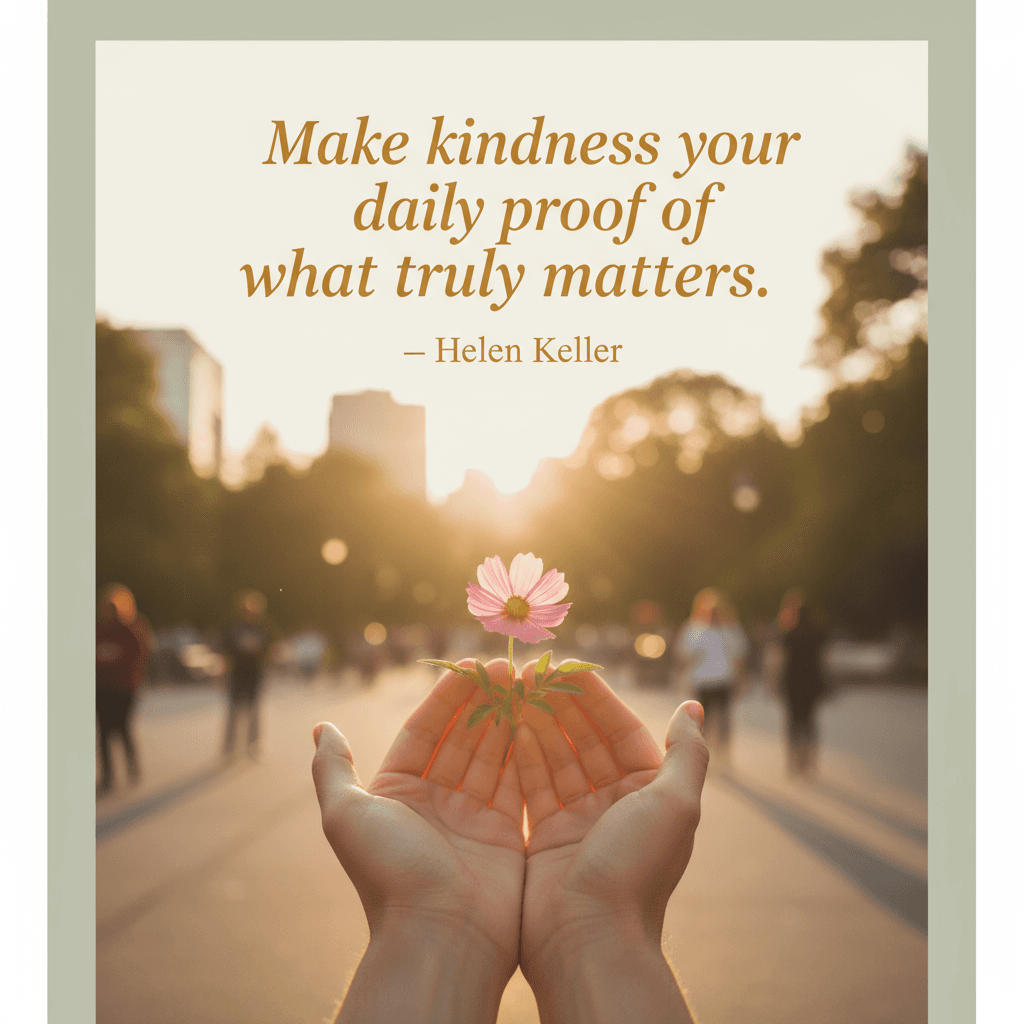Kindness as Daily Proof of What Matters

Make kindness your daily proof of what truly matters. — Helen Keller
From Ideal to Everyday Evidence
The line invites a shift from abstract sentiment to tangible demonstration: if something truly matters, let kindness be its measurable trace. Instead of arguing for our values, we verify them in small, repeatable acts that anyone can observe. Helen Keller’s public life modeled this orientation; rather than merely speaking about dignity, she embodied it in persistent outreach and advocacy. In effect, the day becomes a laboratory, and kindness the experiment that confirms our deepest convictions. Through this lens, proof is not a speech but a pattern, not a claim but a practice. And because practices accumulate, the simplest gestures—an attentive pause, a patient reply—become cumulative evidence of meaning. Thus the question shifts from what we believe to what we are willing to do, and to do again tomorrow.
Pragmatism: Truth Tested in Deeds
Building on that, pragmatist philosophy reframes truth as what proves itself in lived consequences. William James’s Pragmatism (1907) argues that ideas earn their keep by working in experience; an idea that reliably produces humane outcomes counts as more true for us. In this light, kindness is not sentimental garnish—it is verification. When a considerate email de-escalates conflict, or a fair policy reduces harm, the results witness to the rightness of the underlying value. This is why the quote leans on daily proof: frequency turns outcomes into evidence. Moreover, by privileging concrete effects over noble intentions, pragmatism keeps us honest. It asks, did this choice lessen suffering, strengthen trust, or widen access? If so, kindness has done more than feel good—it has passed a real-world test.
Habits That Shape Character
Consequently, the work of kindness is best understood as habit, not occasional heroism. Aristotle’s Nicomachean Ethics (c. 4th century BC) insists we become just by doing just acts; virtue is a settled disposition forged through repetition. The same applies here: a consistent cadence of helpfulness trains perception and reflex alike. Helen Keller’s own breakthrough at the water pump—recounted in The Story of My Life (1903), where she grasped that w-a-t-e-r named the cool stream over her hand—grew out of Anne Sullivan’s patient, repeated instruction. That discipline of patient presence became a template for Keller’s later commitments. In practice, kindness drilled daily remakes us from the inside out: first as effort, then as inclination, and finally as character. Thus the “daily” in the quote is not a calendar note; it is the forge.
The Science of Prosocial Joy
Furthermore, research suggests kindness is both morally sound and psychologically wise. Dunn, Aknin, and Norton’s Science study (2008) showed that spending on others reliably increased happiness more than spending on oneself. Across cultures, Aknin et al. (2013) found similar prosocial boosts, indicating a broad human pattern. Complementing this, Sonja Lyubomirsky and colleagues (2005) reported that clustering small acts of kindness—such as doing five in one day—elevated well-being. These findings align with the quote’s insistence on regularity: repeated prosocial acts produce compounding returns in meaning and mood. Notably, the mechanism is social as much as chemical; kindness strengthens bonds, which in turn buffer stress and amplify resilience. Thus the daily practice is not only ethical proof but also a steadying source of joy.
Ripples, Fruits, and Public Good
Extending outward, kindness scales through networks. Fowler and Christakis (PNAS, 2010) documented how cooperative behaviors cascade, increasing prosociality across social ties. This echoes an older ethical test—“By their fruits you will know them” (Matthew 7:16)—where outcomes reveal the tree. Helen Keller’s activism illustrates this ripple: through decades with the American Foundation for the Blind, she visited hospitals and schools in more than thirty countries, catalyzing braille libraries, vocational training, and policy attention. The point is not celebrity but structure; personal kindness, repeated and organized, becomes institutional care. When policies embed humane defaults—clear signage, accessible formats, fair leave—they transform private virtues into public goods. In that way, the proof of what matters is legible not only in smiles but in systems.
Practices for a Proof-Filled Day
Finally, translating conviction into cadence requires design. Begin by naming a value—dignity, inclusion, honesty—and attach one small act you can repeat: greet by name, leave clear notes, respond within a day. Next, make kindness specific and visible: hold the door, cite colleagues generously, or ask one curious question in each meeting. Then, align systems with values: template accessible documents, schedule time for mentoring, or set default budgets for community giving. Reflect weekly—what helped, what hindered, what surprised? As in Keller’s life, patience sustains progress; when you miss a beat, restart the rhythm. Over time, these simple, steady acts become your living footnotes. And as they accumulate, they do more than signal virtue—they constitute the daily proof of what truly matters.